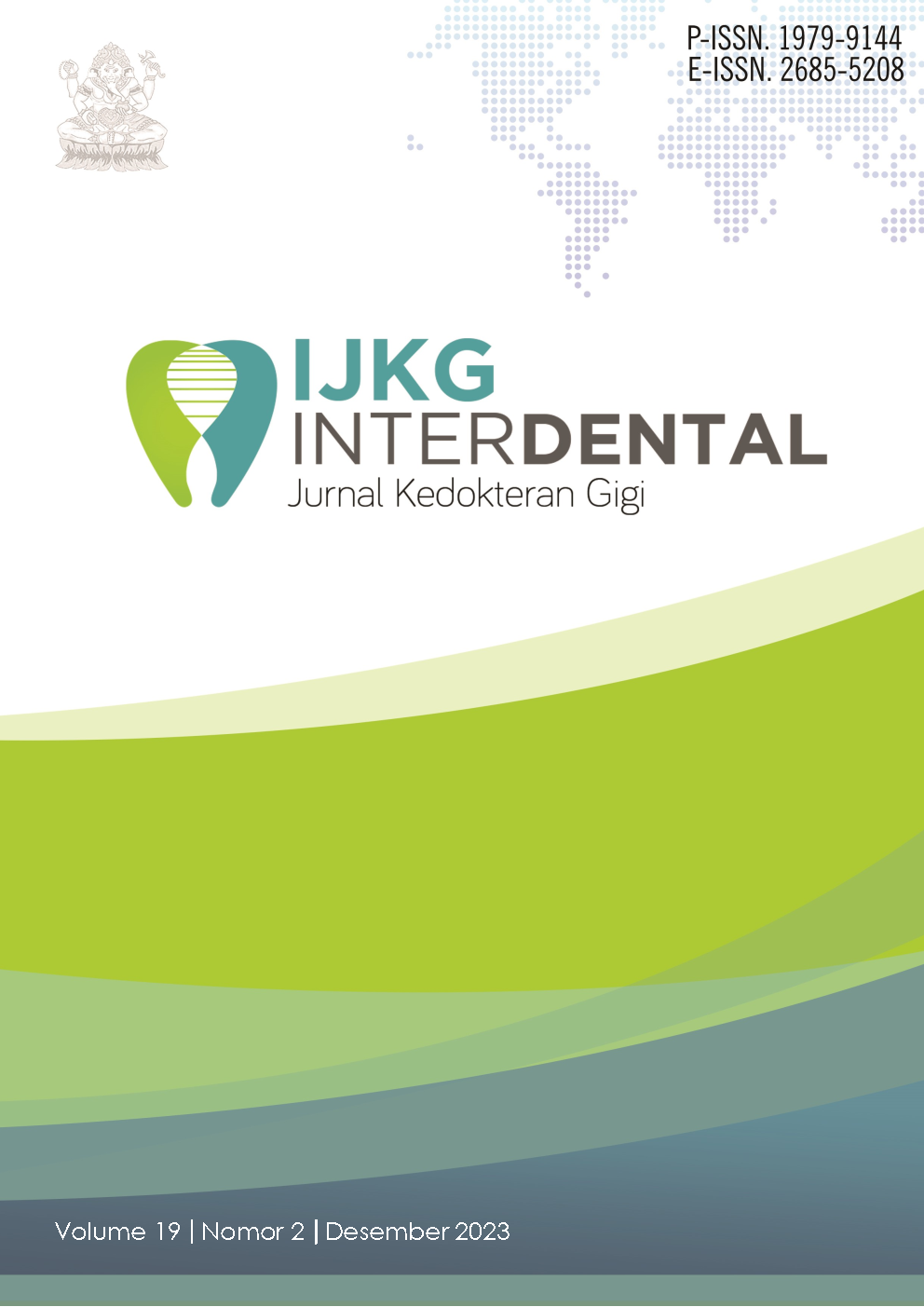IMPLEMENTATION OF THE MOBILE-BASED DENTALK APPLICATION AS A MEDIA FOR INCREASING PUBLIC KNOWLEDGE IN USING THE TELEDENTISTRY APPLICATION
DOI:
https://doi.org/10.46862/interdental.v19i2.7115Keywords:
apps dentalk, knowledge, teledentistryAbstract
Background: Teledentistry is defined as a method of using virtual conferencing technology to provide convenient diagnostics for remote care. The biggest challenge in the development of teledentistry is the understanding and knowledge of the public to use the service. Dentalk is an application designed as part of teledentistry that can provide easy access to dental health services, such as diagnosis, action plan, consultation, and follow-up.
Material and Method: The type of research used is quasi-experimental research with pre-test and post-test group design. Questionnaires were made to measure the sample's knowledge in using the teledenstistry application, in this case the dentalk application. The research sample is a subject taken from a population that meets the research criteria, namely 40 samples.
Result and Discussion: Based on the results of the comparison test, the value of 0.000 < alpha 0.05 means that there are differences in knowledge before and after using the dentalk application respondent.
Conclusion: The paired sample t-test results can be concluded that there is an increase in knowledge in using the dentalk application.
Downloads
References
Yusmanijar Ma. Hubungan Tingkat Pengetahuan Tentang Kesehatan Gigi Dan Mulut Dengan Perilaku Perawatan Gigi Dan Mulut Pada Anak Usia Sekolah 7-9 Tahun di SD Islam Al Amal Jaticempaka. J Kedokt Gigi Terpadu. 2019;2(1):18.
Kementerian Kesehatan RI. Profil Kesehatan Indonesia 2014 [Internet]. Vol. 1227. 2018. 496 p. Available from: website: http://www.kemkes.go.id
Nugroho, A. P. Nugroho, A. P. Dokter Google: Interaksi Dokter-Pasien Di Era Teknologi Informasi. Jurnal Pemikiran Sosiologi Vol. 3 No. 1. 2016;2(1):19
Rahman, Nathwani, Teledentistry from a patient perspective during the coronavirus pandemic. British Dental Journal; 2020; 229(3), 1–4. https://doi.org/10.1038/s41415-020. 2020
A. Champion. Comparison of patient satisfaction measures between in-person and telemedicine postoperative appointments following third molar surgery. International Journal of Oral and Maxillofacial Surgery 2021; 50(6), 830–834 https://doi.org/https://doi.org/10.1016/j.ijom.2 020.12.012. 2021
Abbas. Role of Teledentistry in COVID-19 Pandemic: A Nationwide Comparative Analysis among Dental Professionals. European Journal of Dentistry.2020;4(2):21. https://doi.org/https://dx.doi.org/10.1055
Rahman N, Nathwani S, Kandiah T. Teledentistry from a patient perspective during the coronavirus pandemic. Br Dent J. 2020; 229(3):1–4.
Byrne E, Watkinson S. Patient and clinician satisfaction with video consultations during the COVID-19 pandemic: an opportunity for a new way of working. J Orthod. 2021; 48(1):64–73.
Murererehe J, Uwambaye P, Isyagi M, Nyandwi T, Njunwa K. Niinuma A. Newly developed resinous direct pulp capping agent containing calcium hydroxide (MTYA1-Ca). International Endodontic Journal 2017; 4(1):39–47.
Fajrin FN, Fitri H, Kasuma N, Wiska R, Putri WL, Ortodonsi D. Efek Teledentistry Terhadap Pengetahuan Siswa Sekolah Dasar Tentang Diet Yang Benar Untuk Kesehatan Gigi. J Kedokt Gigi Univ Baiturrahmah. 2020; 9(1):26–32.
Alex Aryanto. Gambaran Pengetahuan, Persepsi, dan Pengalaman dokter gigi di Makassar tentang pemanfaatan Teledentistry media dental care. Disertasi. Makassar: Pascasarjana Universitas Hasanuddin; 2021. h.12-16.
Estai M, Kanagasingam Y, Mehdizadeh M, Vignarajan J, Norman R, Huang B. Teledentistry as a novel pathway to improve dental health in school children: A research protocol for a randomised controlled trial. BMC Oral Health. 2020;20(1):1–9.
Rahmawati DI, Rukiyati R. Developing Pop-Up Book Learning Media to Improve Cognitive Ability of Children Aged 4-5 Years. Adv. Soc. Sci. Educ. Humanit Res. 2018;249(Secret):60–9.
Downloads
Published
How to Cite
Issue
Section
License
Copyright (c) 2023 Sari Aldilawati, Amanah Pertiwisari, Andi Muhammad Irfan M.Amir

This work is licensed under a Creative Commons Attribution-ShareAlike 4.0 International License.
- Every manuscript submitted to must observe the policy and terms set by the Interdental Jurnal Kedokteran Gigi (IJKG)
- Publication rights to manuscript content published by the Interdental Jurnal Kedokteran Gigi (IJKG) is owned by the journal with the consent and approval of the author(s) concerned.
- Full texts of electronically published manuscripts can be accessed free of charge and used according to the license shown below.













